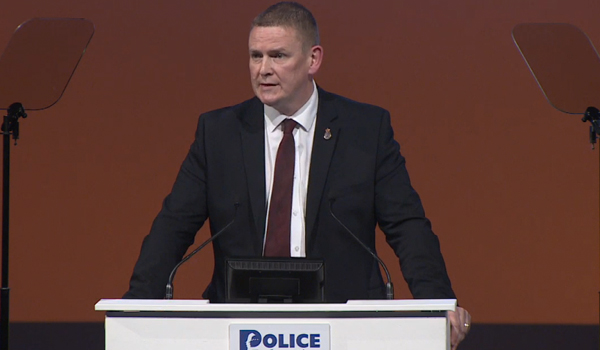PFEW: Together we can achieve better protection from assault
Workers from across the public sector must join together to secure more protections from assault, the Police Federation of England and Wales (PFEW) conference has heard.
Workers from across the public sector must join together to secure more protections from assault, the Police Federation of England and Wales (PFEW) conference has heard.
Officers have become societys punch bags as current legislation does not provide a strong enough deterrent, West Yorkshire Police Federation chair Nick Smart told delegates on Tuesday (May 16).
The PFEW is campaigning for better protections but vice chair Calum Macleod said emergency service workers have to do our bit in their own local areas to help.
Mr Macleod said: We stand with our colleagues from across the public sector and demand this change.
Together we can achieve this. We all have a responsibility to ensure that we all do what we can to make that happen.
We have no option. Its our members. We have to protect the protectors.
Ministry of Justice statistics suggest more than 16,000 cases of officer assaults were recorded in 2015.
However, while nearly 83 per cent of suspects were found guilty, just 1,104 received custodial sentences with an average length of eight weeks.
The true figures are likely to be even more extreme, as forces were not required to record assaults.
The PFEW estimates that there are 2.4 million attacks on officers every year.
To help reduce this and pressure the government to act on its campaign Mr Macleod urged officers to record every instance where they are assaulted in the line of duty.
He also believes officers should work with local partners and authorities to better understand the amount of assaults on emergency service workers in their area, and utilise local media to raise awareness of the problem.
In February, the PFEWs campaign led to a Ten Minute Rule Bill providing officers more protections from assault passing the first stage in the House of Commons.
The Bill, brought by Halifax MP Holly Lynch, aims to class certain offences as aggravated when committed against emergency services workers.
It would also make it a crime to refuse to provide a blood sample after spitting at an emergency services worker.
Provision of spit guards became a contentious issue at the conference when Shadow Home Secretary Diane Abbott suggested that officers who are spat at are not at risk of contracting hepatitis C or HIV.
Ms Abbott, who has previously spoken out against the devices, claimed she is not against spit guards in principle but cited concerns by campaigners that these diseases cannot be transferred through saliva.
She added that she remains unconvinced that the devices do not pose a health risk to detainees.
Her comments were criticised by officers who claimed the main purpose of spit guards is to protect officers from being spat at, not from disease.
Ken Marsh, chair of the Metropolitan Police Federation, added that 42 officers were spat at while policing last years Notting Hill Carnival and 16 needed hospital treatment.


